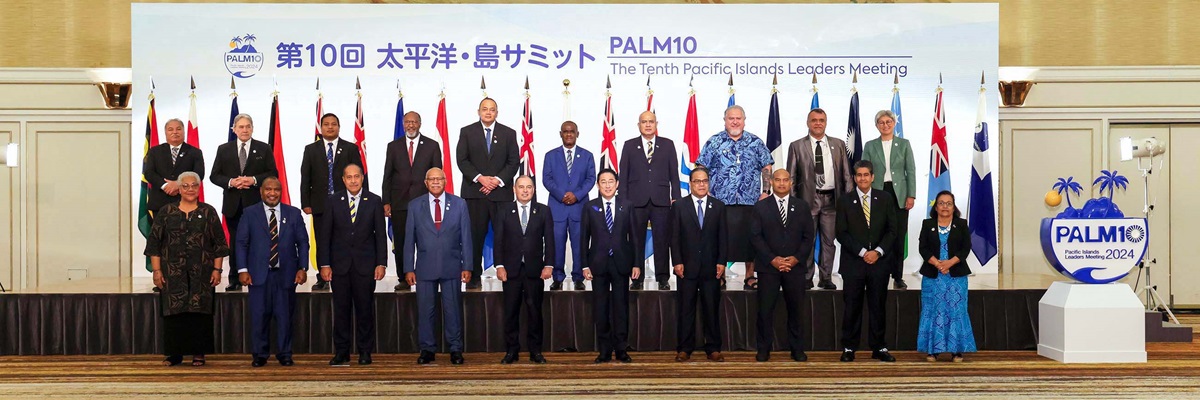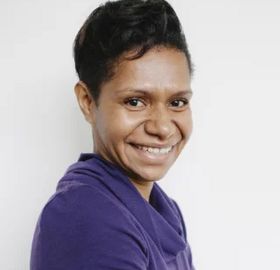Diplomacy
Who speaks for the Pacific?

Image Source : Wikimedia Commons
Subscribe to our weekly newsletters for free
If you want to subscribe to World & New World Newsletter, please enter
your e-mail
Diplomacy

Image Source : Wikimedia Commons
First Published in: Sep.05,2024
Oct.14, 2024
As the Pacific Islands Forum came to an end, the underlying questions remain: who has a voice and legitimacy to influence the region, and who doesn’t
The Pacific Islands – a grouping largely made up of small island developing states – is in the middle of an increasingly contested strategic space, making regional politics an important, and closely observed, site. At the end of August, Pacific Islands Forum heads of government met in Tonga for the organisation’s annual leaders’ meeting. Along with the Pacific heads of government, other dignitaries were also present, including United Nations Secretary General António Guterres. This is the apex event on the regional calendar, and it came with a crowded agenda, including issues like climate change, transnational crime and health security. But one of the pressing issues facing the Forum is an existential one, as membership debates and geopolitical tussles highlight: the question of who and what the Forum represents.
In recent years, divisions within the region have become apparent, including the perceived marginalisation of North Pacific countries in what was initially called the South Pacific Forum. These tensions culminated in the decision by five Micronesian states to leave the Forum in 2021, although this was later reversed. Yet, the final Forum communiqué demonstrates that Pacific leaders are on the same page on many issues, covering agreed outcomes relating to health, education, fisheries and other key issues. Climate change was highlighted as ‘a matter of priority to the Pacific region’ and as an intersecting and broad-ranging issue affecting Pacific states. A new Pacific Policing Initiative – a proposal to create a multinational Pacific police force and invest in subregional policing hubs – was endorsed, although in a nod to some debate surrounding its implementation, leaders emphasised the need for further consultation.
Emerging geopolitical frictions
A controversy over the final version of the communiqué, however, highlights enduring divisions in the Forum. In the communiqué initially published online on Friday afternoon, paragraph 66 read that ‘Leaders reaffirmed the 1992 Leaders decision on relations with Taiwan/Republic of China.’ This refers to Taiwan’s established status as a ‘development partner’ of the Forum. After public statements from China’s special envoy for the Pacific Qian Bo criticising this language, the communiqué was taken offline and revised, with the paragraph referencing Taiwan removed. Forum officials blamed the confusion on an administrative error.
Three of the 18 full members of the Forum recognise Taiwan: Marshall Islands, Palau and Tuvalu. While the Pacific was once a key focus of Taiwan’s diplomatic strategy, its influence has waned in the region in recent years with moves from Solomon Islands, Kiribati and Nauru to shift recognition to Beijing, prompted by a diplomatic offensive by the People’s Republic of China. In an increasingly contested geopolitical context, Taiwan’s status in regards to the Forum is likely to remain a difficult topic for member countries.
The concept of sovereignty has always been relatively flexible in the Forum: founding members include the Cook Islands and Niue, which are countries in free association with New Zealand and are not UN member states.
In light of rising strategic competition, issues of membership of the Forum also raise existential questions for its future. In 2016, the French territories of New Caledonia and French Polynesia became full Forum members. But their political status does pose interesting questions for the Forum, especially considering the recent riots and ongoing tensions in New Caledonia. In the Forum communiqué, leaders reaffirmed a decision to send a mission to New Caledonia, a move that has been fraught; prior to the meeting, the French Ambassador to the Pacific had asserted that ‘New Caledonia is French territory and it is the [French] State which decides on who enters’.
The communiqué also endorsed the applications for associate member status for Guam and American Samoa, two US territories with clear ambitions to accede to full membership status in the future as New Caledonia and French Polynesia have. The concept of sovereignty has always been relatively flexible in the Forum: founding members include the Cook Islands and Niue, which are countries in free association with New Zealand and are not United Nations member states and also do not issue their own passports. Yet, the 2016 decision represented a substantive shift in the principles of Forum membership, one likely to bolster the claims to full membership of other territories.
On the one hand, it can be argued that the Forum is becoming more representative in encompassing more Pacific polities and acknowledging the remarkable diversity in political status that exists in the region. On the other, an expanding membership raises questions of the influence of metropolitan powers like France and the US in the Forum. This is an already fraught conversation given the perceived outsized influence of founding member states Australia and New Zealand.
Pacific leaders have in the past been outspokenly critical about the role of larger countries in the Forum, given the power differentials and differences in policy on key issues like climate change.
France and the US, along with Australia and New Zealand, all have colonial histories – and, for many, an enduring colonial presence – in the region. Given this context, their present and prospective roles in the Forum have been critiqued as preventing the institution from being a truly Pacific space. Pacific leaders like former Fijian Prime Minister Frank Bainimarama have in the past been outspokenly critical about the role of larger countries in the Forum, given the power differentials and differences in policy on key issues like climate change.
Behind all of these decisions and controversies are fundamental questions: who has a voice in the Forum and who does not; who has the legitimacy to exert influence in the region and who does not. Resolving these issues in a way that strengthens the Forum’s own legitimacy as the primary regional institution is a pressing and existential matter. In the midst of this, what was not on the Forum agenda is also worth considering. Even in the presence of two elected women heads of government – President Hilda Heine of Marshall Islands and Prime Minister Fiamē Naomi Mata’afa of Samoa – and even following last year’s endorsement of a Revitalised Pacific Leaders Gender Equality Declaration, gender equality is absent from the 2024 communiqué.
First published in :

Kerryn Baker is a Fellow in the Department of Pacific Affairs, ANU. She has a BA in International Relations from Victoria University of Wellington and a PhD in Political Science from the ANU. She has research experience in the French Pacific, Papua New Guinea (including Bougainville), Samoa, Solomon Islands, Tonga and Vanuatu. She had published in leading journals including Pacific Affairs, Government and Opposition, Australian Journal of Political Science, International Political Science Review, Parliamentary Affairs and Third World Quarterly on issues of political participation, electoral reform and women’s political representation. Her book Pacific Women in Politics: Gender Quota Campaigns in the Pacific Islands was published by University of Hawaii Press in 2019.

Theresa Meki is a Pacific Research Fellow with the Department of Pacific Affairs, Coral Bell School of Asia Pacific Affairs. Her research focuses on women’s presence and vote share in Papua New Guinea’s election history. She is interested in elections and women’s political representation in Melanesia more broadly. Her PhD research explored women’s political participation in Papua New Guinea’s 2017 national election from a gendered perspective.
Unlock articles by signing up or logging in.
Become a member for unrestricted reading!